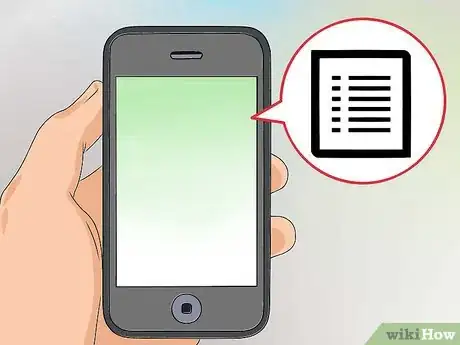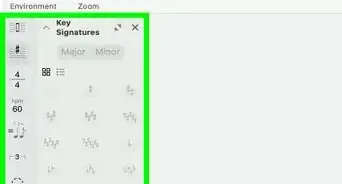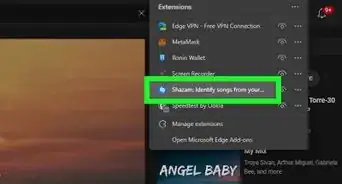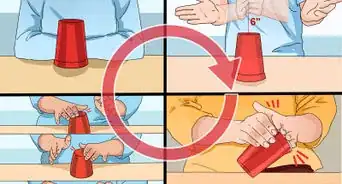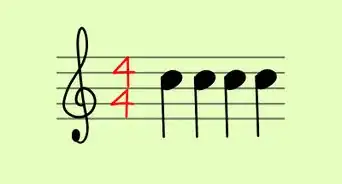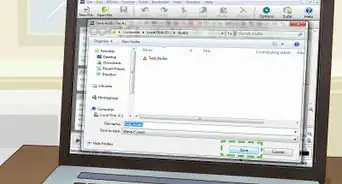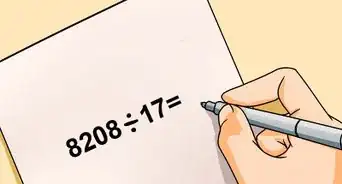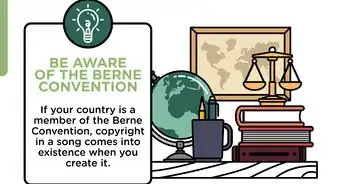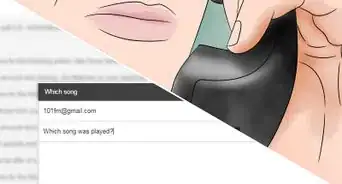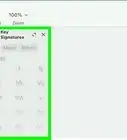wikiHow is a “wiki,” similar to Wikipedia, which means that many of our articles are co-written by multiple authors. To create this article, 27 people, some anonymous, worked to edit and improve it over time.
There are 16 references cited in this article, which can be found at the bottom of the page.
This article has been viewed 1,253,862 times.
Learn more...
It's happened to all of us at one point or another; we get a song stuck in our heads, but can't figure out what the song actually is. While lyrics are still the easiest way to recognise a tune, something like a simple melody can be all you need to identify music. Asking a musically-inclined friend for help may be a good start, but in the age of apps and smart technology, there's a ton of online programs specifically designed to help you as well.
Steps
Using Technology
-
1Find the right app or program for you. There is a world of app, programs, sites and web communities specifically devoted to music identification. As it turns out, you're in great company if you are looking to identify a song.
- Online music finders like Midomi and WatZatSong are great places to meet people with experience and interest in identifying music. [1] [2]
- Virtual piano keyboards are available to identify melodies on several sites online, most notably Folk Tune Finder and Musipedia.[3] [4]
- If you have formal music training, inputting the notes via notation (C, C#, D etc.) is also an option on sites like JC ABC Tune Finder and Themefinder. [5] [6]
-
2Use a music-recognition app. If you're somewhere the mystery song is being played somewhere around you, you can use the Shazam app to identify it for you.[7] Download the app, and aim your phone towards the music for several seconds. In the majority of cases, the app will be able to tell you exactly which song and artist are playing at the moment.
- Soundhound is another great music-recognition app. With it, you can get the song you're looking for by briefly humming into a mic. It's far from perfect, but could be a quick fix if you've got a melody on your mind.[8]
- Most times a music-recognition app fails, it's because there is too much background noise for the app to get a clear reading of the music. If that happens, wait until it becomes more quiet, or find another area where you're get a more direct feed of the music.
Advertisement -
3Record yourself humming the melody.[9] Find somewhere peaceful and quiet. Once you're settled, record yourself humming or singing the melody. You won't need anything more than a basic webcam mic to suit your recording purposes. Take care to sing it as clearly and as accurately as possible, as this will be all the database or online community has to help you with.
- If you've chosen to input the melody via a virtual keyboard, take care to make sure the rhythm and notes are as accurate as you can make them.
-
4Include any additional details you can think of. If the program or site you're using offers a text box, you should use it to fill in as much information as you know about the song.[10] The most help details should include the probable genre of the music, and the setting you first heard it. While this doesn't apply to automated databases, it could mean the different between a community member pinpointing it or not for you.
-
5Post up your query.[11] How you go about posting will vary depending on the site. Most will require you to start an account; this shouldn't take more than a couple of minutes to wade through. From there, it should be a straightforward process of putting up your post and waiting for the answers to start rolling in.
-
6Wait for an answer. The communities on sites like Midomi are passionate and helpful, and should be quick to help you out with your query. If you get different answers as to what song it is, it's recommended you check all of them. When you're finally hearing the song you've been looking for, it should click in immediately. There's a great feeling of relief and satisfaction in identifying a song you were looking for, so bask in the glory!
- YouTube is an extensive and ubiquitous way of hearing music. No matter how obscure or recent, there should be a streaming video with the song you're looking to hear.
Remembering on Your Own
-
1Try to think how much you remember of the song.[12] If you are trying to remember a song you forgot as opposed to identifying a song from scratch, you may be able to remember it yourself. If you have the song's melody in mind, try to recall if you remember anything else alongside it. Was there a catchy lyric or rhythm that caught your ear as well? Although melody is the easiest part of music to remember, you'll have your best chance identifying the song the more details you recollect.
- Remembering a lyric is the most helpful when it comes to song identification, as three or four words from a lyric in sequence can yield a successful Google search.
- Sadly, success with remembering isn't the sort of thing that can be forced, and success cannot be promised, only made more likely.
-
2Meditate. On top of its other mental health benefits, meditating can be a great idea to recall memories. Find somewhere quiet and tranquil to unwind, and let your thoughts go blank. Focus on your breathing, and keep your respiration slow and controlled. Let yourself meditate for 10-15 minutes. Allow yourself to drift away from trying to remember the song; if the song ends up popping into your head, it will do so on its own accord and cannot be forced.[13]
- Meditating with the pure intent of memory recall may defeat the purpose, as your brain will still be under the strain of trying to remember.
-
3Visit the place you last heard the song. Quite often, going to the last place you heard the song in question will help bring other details to light. Return to the place, preferably at the same time of day you heard the song, and picture yourself listening to the melody.
- This step need not apply solely to physical spaces. If you heard the song on a particular radio station for example, you might find it helpful to return to that station and listen to the broadcast. Popular music stations are prone to repeating songs frequently anyway. You might end up hearing the song you were looking for if you tune in for long enough.
-
4Hum the melody repeatedly. If you have a clear grasp of the song's melody, humming it out loud will allow you to focus on it. By making it tangible to your ears, your brain may fill in the gaps of what it remembers being there, and you'll have an easier time bringing the memories you're looking for to the forefront of your consciousness.[14]
- Better still, you might consider recording yourself humming the melody. That way, you can listen to it purely as an active listener.[15]
-
5Do something else and let it come to you. Forcing yourself to remember something can be very frustrating. If you're wanting to remember a song on your own, sometimes the best way to go about it is letting your brain go elsewhere. Occupy yourself with something different and go about your regular daily routine. It's obviously not something you can depend on for results, but it's not unheard of that the song (as well as its title) will rush into your head once you're invested in something else.
Getting Help from Someone
-
1Consider what you know of the song. If you're trying to identify a song simply using a melody, it is first important to consider how much of that melody you actually remember. Every little bit of information helps, and will increase the likelihood that a friend will be able to pinpoint the song for you.
- Being a more attentive listener throughout your music-listening habits will make future scenarios like this much easier to grapple with.[16]
- Take care to make sure that all of the information you think you remember is actually right. The memory can be a strange thing, and a few botched notes in your melody can lead your helper completely astray.
-
2Find a friend who might know the song.[17] Choosing the right person to help you has a lot to do with what you currently remember of the song itself. If you distinctly remember the song's melody chances are you'll know the genre as well. Many people prefer certain genres over others, and the ones that tend to listen to the genre of the song in question will subsequently have the highest chance of successfully helping you out.
- Enlisting the help of friends with formal musical training is helpful too, as they are used to identifying music purely on the basis of melody.
-
3Play or sing the melody.[18] Find somewhere non-distracting and relatively quiet; that way, there won't be uncontrolled factors hindering the process. Sit down with your friend and recreate the melody for them, whether with your voice or the piano. Take care to accurately reproduce the cadence and rhythm of the melody as well-- melody entails far more than a simple sequence of notes!
- While you can technically recreate the melody on just about any musical instrument, it's actually recommended you try doing it with your voice. Especially if you're not a trained musician yourself, the human voice offers a lot of potential for expression. In singing the melody, you might be able to get some of the timbre and tone across as well, making your approximation that much more specific.
-
4Describe the other parts of the music you remember.[19] Giving your helper some context as to the tone, rhythm and general style of the song can help them pinpoint a song just as well as any melody. Part of what you're doing is trying to give them an accurate impression inside their head as to the song. That way, they'll have an easier time to pinpointing it.
- Many melodies can be used by multiple songs, so providing a little bit of context can go a long way towards helping identifying the song in question.
-
5Brainstorm.[20] Now that you've given them the melody, you and your friend can brainstorm as to what it's about. Encourage them to ask you questions about the song. It is possible you still remember more than the information you've offered them. Give another hum to the melody once the two of you have discussed it a little bit, and see if either of you approach it any differently.
- While you're talking and humming the melody, you should remain open to the possibility that you'll remember the song yourself, provided it's something you've forgotten as opposed to trying to identify it from scratch.
-
6Ask others. If the first person you ask isn't successful, you should try getting help from other people. In the case of identifying a melody, in most cases it's a simple matter of having it click instantly. What ends up leading to the brainstorming stage for some people may be an instant bid for others. Don't lose hope if you can't get it right the first time; find someone new, and begin the process again.
Community Q&A
-
QuestionName the piece, by G. F. Handel: signed 3-4: in G Major: (D)- G.G.A.-B.B.D.-G.A.F.#-G.-(A)-BAG-F#F#G- A (g-f#)E- D. What song is this?
 Community AnswerSuites de Pièces?
Community AnswerSuites de Pièces? -
QuestionI'm looking for the name of a song by a female artist where the word "you" is repeated many times in the chorus.
 Community AnswerIt could be "You You You You You" by The 6ths or "You" by Charlie XCX.
Community AnswerIt could be "You You You You You" by The 6ths or "You" by Charlie XCX.
Warnings
- If you are trying to remember a song, keep in mind that you may be doing your own efforts a disservice by trying too hard to recall. Sometimes it's best to give your mind a break; for all you know, the name might hit you randomly.⧼thumbs_response⧽
- Online databases aren't infallible, and cannot hope to stay up to date with all of the new music coming out these days. A classic song will be much easier to identify than something that debuted a week ago, as far as these programs are concerned. If you know the song is new, your best bet is to ask other people about it; if it's been played all over the radio, the song will be fresh in their memories as well.⧼thumbs_response⧽
- If you're having persistent trouble, you might consider the possibility you have forgotten the melody itself. If that's the case, you'll have inadvertently sabotaged the utility of most Music Recognition programs.⧼thumbs_response⧽
References
- ↑ http://www.midomi.com/
- ↑ http://www.watzatsong.com/
- ↑ http://www.folktunefinder.com/
- ↑ http://www.musipedia.org/
- ↑ http://trillian.mit.edu/~jc/cgi/abc/tunefind
- ↑ http://www.themefinder.org/
- ↑ https://www.shazam.com
- ↑ http://www.pcmech.com/article/how-to-identify-that-song-you-heard-but-cant-remember-theres-an-app-for-that/
- ↑ http://www.pcmech.com/article/how-to-identify-that-song-you-heard-but-cant-remember-theres-an-app-for-that/
- ↑ http://mashable.com/2009/08/30/find-that-song-name/#SauHwML7egqD
- ↑ http://mashable.com/2009/08/30/find-that-song-name/#SauHwML7egqD
- ↑ http://music.stackexchange.com/questions/3009/how-do-you-remember-your-music-and-how-do-i-improve-in-this-regard
- ↑ http://operationmeditation.com/discover/5-great-ways-to-improve-memory-recall/
- ↑ http://your-personal-singing-guide.com/singing-melody.html
- ↑ http://your-personal-singing-guide.com/singing-melody.html
- ↑ http://music.stackexchange.com/questions/3009/how-do-you-remember-your-music-and-how-do-i-improve-in-this-regard
- ↑ http://elitedaily.com/life/music-taste-a-reflection/1205908/
- ↑ http://www.choose-piano-lessons.com/piano-notes.html
- ↑ http://grammar.yourdictionary.com/style-and-usage/descriptive-rds-for-music.html
- ↑ http://www.forbes.com/sites/susanadams/2013/03/05/4-steps-to-successful-brainstorming/



